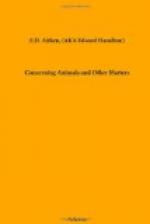It seemed to be time now to begin Tommy’s education, for I judged that, if he had been at home, he would ere then have been getting nightly lessons in the poacher’s art. So I procured a small gecko, one of those grey house lizards, with pellets at the ends of their toes, which come down from the roof after the lamps are lit and gorge themselves on the foolish moths and plant bugs that come to the light. Securing it with a thin cord tied round its waist, I introduced it into Tommy’s cage. He looked surprised, very much surprised. He raised himself to his full height. He gazed at it. He curtseyed. He gave a little jump and was standing with both feet on the lizard. A moment more and the lizard was gliding down his throat with my thin cord after it. Mr. Seton Thompson would have us believe that all young things are laboriously trained by their parents, just like human children, and if he was an eye-witness of all the scenes that he describes so vividly, it must be so with other young things. But he did not know Tommy, who is the bird of Minerva and evidently sprang into being, like his patron goddess, with all his armour on.
After a time, when he had exchanged his infant down for a suit of feathers, he was promoted to a large cage out in the garden, and his regular diet was a little raw meat or a mutton bone tied to one of his perches, but, by way of a treat, I would offer him, whenever I could get it, a locust, or large grasshopper. His way of accepting this was unique and pretty. He would look surprised, stare, curtsey once or twice, stare again and then, suddenly, noiselessly and as lightly as a fairy, flit across the cage and, without alighting, pluck the insect from my fingers with both his feet and return to his perch.




